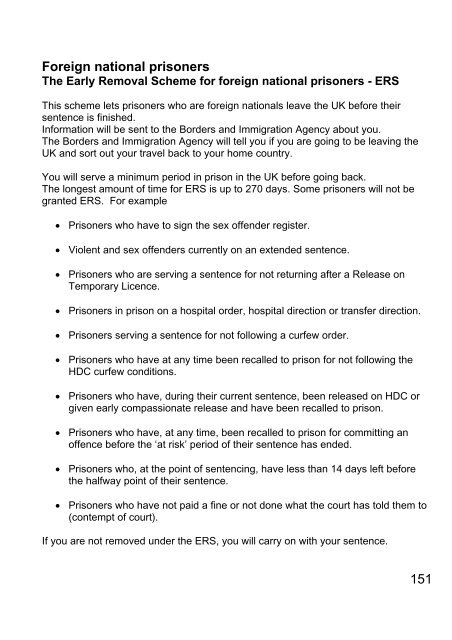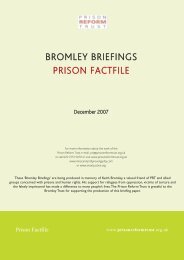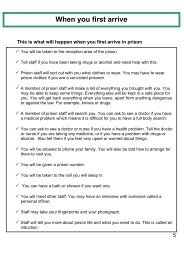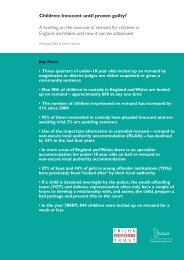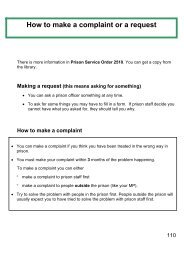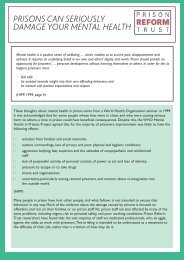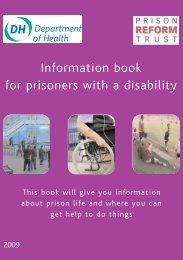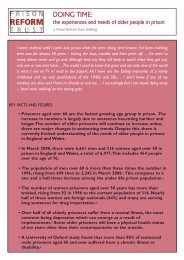151 Foreign national prisoners - Prison Reform Trust
151 Foreign national prisoners - Prison Reform Trust
151 Foreign national prisoners - Prison Reform Trust
You also want an ePaper? Increase the reach of your titles
YUMPU automatically turns print PDFs into web optimized ePapers that Google loves.
<strong>Foreign</strong> <strong>national</strong> <strong>prisoners</strong><br />
The Early Removal Scheme for foreign <strong>national</strong> <strong>prisoners</strong> - ERS<br />
This scheme lets <strong>prisoners</strong> who are foreign <strong>national</strong>s leave the UK before their<br />
sentence is finished.<br />
Information will be sent to the Borders and Immigration Agency about you.<br />
The Borders and Immigration Agency will tell you if you are going to be leaving the<br />
UK and sort out your travel back to your home country.<br />
You will serve a minimum period in prison in the UK before going back.<br />
The longest amount of time for ERS is up to 270 days. Some <strong>prisoners</strong> will not be<br />
granted ERS. For example<br />
• <strong>Prison</strong>ers who have to sign the sex offender register.<br />
• Violent and sex offenders currently on an extended sentence.<br />
• <strong>Prison</strong>ers who are serving a sentence for not returning after a Release on<br />
Temporary Licence.<br />
• <strong>Prison</strong>ers in prison on a hospital order, hospital direction or transfer direction.<br />
• <strong>Prison</strong>ers serving a sentence for not following a curfew order.<br />
• <strong>Prison</strong>ers who have at any time been recalled to prison for not following the<br />
HDC curfew conditions.<br />
• <strong>Prison</strong>ers who have, during their current sentence, been released on HDC or<br />
given early compassionate release and have been recalled to prison.<br />
• <strong>Prison</strong>ers who have, at any time, been recalled to prison for committing an<br />
offence before the ‘at risk’ period of their sentence has ended.<br />
• <strong>Prison</strong>ers who, at the point of sentencing, have less than 14 days left before<br />
the halfway point of their sentence.<br />
• <strong>Prison</strong>ers who have not paid a fine or not done what the court has told them to<br />
(contempt of court).<br />
If you are not removed under the ERS, you will carry on with your sentence.<br />
<strong>151</strong>
Deportation<br />
The Borders and Immigration Agency will tell you if you are to be deported at the end<br />
of your sentence.<br />
They will serve (send) an Immigration Detention Order to the prison.<br />
You will either stay in prison after the end of your sentence or be sent to an<br />
Immigration Detention Centre until you are deported (removed) from the UK.<br />
If you do not want to be deported you need to talk to a solicitor to find out if you can<br />
appeal.<br />
You can find more information in <strong>Prison</strong> Service Order 4630.<br />
Repatriation<br />
The UK has repatriation agreements with some countries. This means that some<br />
<strong>prisoners</strong> can go to prison back in their own country.<br />
You can be repatriated if<br />
• You are a <strong>national</strong> of the country you want to go to.<br />
• Your sentence is final and no appeal is outstanding.<br />
• The offence you committed would also be an offence punishable by<br />
imprisonment in the other country.<br />
• You have, at the time you make your application, at least 6 months of your<br />
sentence left to serve before release.<br />
<strong>Prison</strong> staff can check if the UK has a repatriation agreement with your country.<br />
You need to use the prison’s request/complaints procedure to start the process to<br />
see if you can be repatriated.<br />
The UK and your country have to make an official request for repatriation.<br />
You can also ask official staff who work at your country’s embassy to make an<br />
application for you.<br />
You can find a list of embassies in <strong>Prison</strong> Service Order 4630.<br />
152
It can take a long time to decide on requests for repatriation, sometimes up to 2<br />
years.<br />
The UK will usually only refuse requests for repatriation if<br />
• you would serve less time in prison if you transferred abroad<br />
• you have a fine or other judicial order for payment outstanding.<br />
If you are repatriated, you must serve the amount of time that you have left to serve<br />
under the sentence you were given in the UK.<br />
You will follow the rules of the country you go to on sentence review, release and<br />
supervision.<br />
You will be told about any changes before you sign your repatriation agreement.<br />
You can find out more from ‘Repatriation of <strong>Prison</strong>ers Act 1984 – Information for<br />
<strong>Foreign</strong> <strong>Prison</strong>ers’, in the prison library.<br />
This information is in Danish, Dutch, English, Finnish, French, German, Greek,<br />
Italian, Portuguese, Spanish, Swedish and Turkish.<br />
Transfers to prisons in Scotland, Northern Ireland, Channel Islands<br />
or the Isle of Man<br />
Transfers from prisons in England or Wales to prisons in these countries are called<br />
transfers to another jurisdiction.<br />
You can ask for a permanent transfer so you can have visits from family and friends.<br />
<strong>Prison</strong> services in both countries have to agree to the transfer.<br />
There are 2 types of transfer<br />
• Unrestricted – your sentence will be completely managed by the area you<br />
move to and you will follow their rules for release and supervision on release.<br />
• Restricted – England and Wales will fix conditions to your transfer. These could<br />
be about release, supervision on release or recall.<br />
153
More about transfers<br />
To stand a good chance of having a transfer request agreed you<br />
• Need to have at least 6 months left to serve before your release date.<br />
• Need to have no outstanding appeal against conviction or sentence.<br />
• Must not be going back to court.<br />
Things that will be looked at as part of your application to transfer are<br />
• Why you want to transfer.<br />
• If you were living most of the time in the country you want to go back to.<br />
• If you have close family and friends there.<br />
• If you have shown that you plan to live there after you are released.<br />
You can also request for your licence to be supervised in Scotland, Northern Ireland,<br />
Channel Islands or the Isle of Man. Ask your offender manager how to do this.<br />
154


